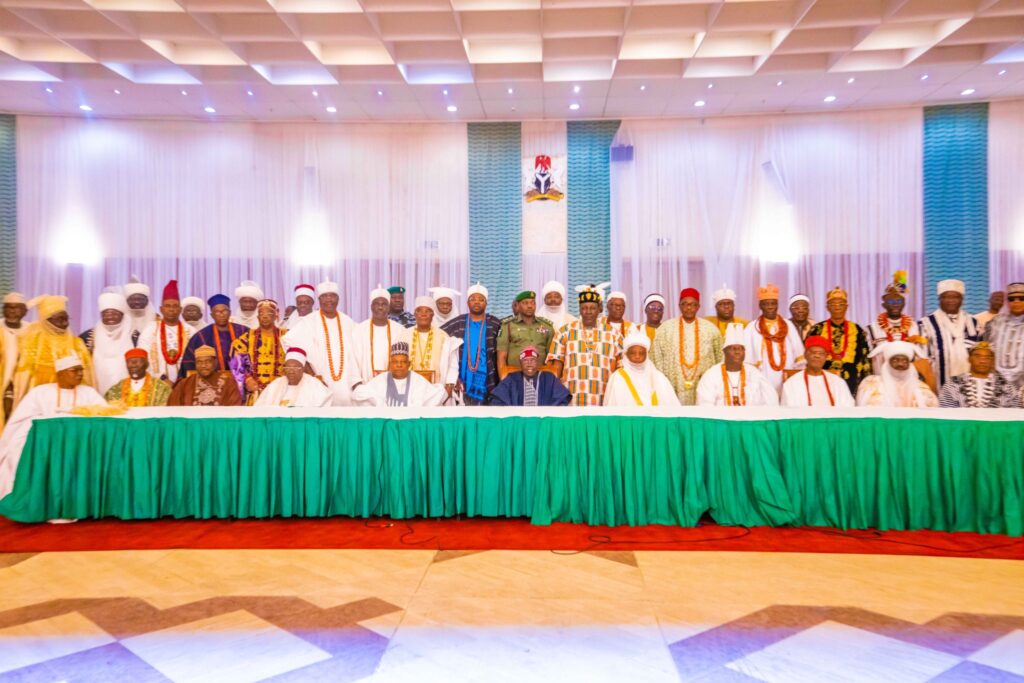
By Tony Onyima
A fresh political and cultural controversy has erupted over the proposed National Council for Traditional Rulers of Nigeria (Establishment) Bill, 2024.
The Middle Belt Forum (MBF) rejects what it describes as a plan to make the Sultan of Sokoto a permanent co-chairman of the national council, a claim the bill’s sponsor, Senator Simon Bako Lalong, has vehemently denied.
In a strongly worded statement released on July 27 and signed by its National Spokesman, Luka Binniyat, the MBF described the clause allegedly conferring permanent co-chairmanship on the Sultan of Sokoto as a “violation of Nigeria’s secular character, cultural heritage, and federal structure.”
The forum warned that any attempt to enact such a provision would provoke widespread resistance, including a potential boycott of the Council by Middle Belt traditional rulers and forming a parallel regional body.
However, in a swift rebuttal the following day, Senator Lalong, a former governor of Plateau State and current Senator representing Plateau South, dismissed the MBF’s claims as “entirely false, misleading, and unfounded.”
In a statement issued by his Special Adviser on Media, Dr. Makut Simon Macham, Lalong clarified that the bill does not designate the Sultan of Sokoto or the Ooni of Ife as permanent co-chairs of the proposed Council.
“For clarity, the Bill provides that the Chairman and two Vice Chairmen (representing North and South) shall be appointed from among the members of the Council. The process remains open, inclusive, and in line with democratic principles,” the statement read.
The MBF’s objections centre on what it views as an attempt to institutionalise the Sultan of Sokoto in a position of permanent cultural supremacy, one they argue is unjustified by history or tradition. While the Forum chose not to comment on the Ooni of Ife’s proposed role, it was unequivocal in rejecting the Sultan’s elevation, citing a broad range of historical, cultural, and moral objections.
The Forum argued that ancient monarchies in the Middle Belt, such as the Kwararafa Confederacy (represented today by the Aku Uka of Wukari), the Igala Kingdom (Attah of Igala), the Tiv Nation (Tor Tiv), and the Nupe Kingdom (Etsu Nupe), all have longer-standing and autonomous legacies that predate or were never subordinated to the Sokoto Caliphate.
“The Sultan of Sokoto can therefore not supersede the Aku Uka of Wukari in status and prestige to sit over him as chairman of the traditional council created by law,” the MBF asserted.
The MBF also expressed concern that the Sultan, as the spiritual leader of Muslims in Nigeria, occupies a religious, not secular position, making his proposed leadership of a national traditional institution constitutionally and culturally inappropriate in a multi-faith, secular state.
“His institutionalised leadership over a national council of traditional rulers would alienate Christians, traditional worshippers, and other faiths,” the Forum said.
The statement further alleged that the Sultan’s long-standing patronage of the Miyetti Allah Cattle Breeders Association (MACBAN), often associated with violent Fulani herders attacks across the Middle Belt, renders him unfit for national leadership in a traditional council context.
If the bill is passed in its current form, the MBF warned that it would respond by Mobilising all ethnic nationalities in the Middle Belt to boycott participation in the Council, instructing traditional rulers from the region to neither recognise nor attend any Council meeting chaired by the Sultan, and forming an autonomous Council of Middle Belt Traditional Rulers that reflects the region’s history and values.
To avoid such an outcome, the MBF proposed a rotational chairmanship, or a tenure-based leadership model, ensuring equitable representation across Nigeria’s geopolitical zones. Alternatively, the Forum suggested, the Council’s leadership could be democratically elected by its members, thereby preserving the dignity of all constituent monarchs.
“Any attempt to impose a permanent religious figurehead on a national institution of traditional rulers is a violation of Nigeria’s secular character… We shall resist it using every lawful and democratic means available to us,” the MBF concluded.
Senator Lalong acknowledged the public interest generated by the bill but emphasised that widespread claims of religious bias and cultural hegemony are based on misreading the bill’s actual provisions.
“The deliberate misrepresentation of the bill’s content appears to be an attempt to derail its noble objectives,” the Senator’s office stated. Lalong clarified that the bill merely seeks to institutionalise the role of traditional rulers in fostering peace, unity, and national development, adding that a public hearing would soon be held to allow stakeholders to review, critique, and improve the bill.
“Senator Lalong welcomes robust public input and urges all concerned individuals, groups, and associations to submit memoranda during the public hearing,” the statement read. However, the Senator warned against the spread of misinformation, saying it “undermines constructive dialogue and national unity.”
The bill, officially SB.546, seeks to give legal backing to the traditional council, which has long operated in an informal advisory capacity to the federal government. It would define the council’s structure, membership, leadership, and functions within Nigeria’s constitutional framework if passed.
With strong opinions emerging from both sides, political analysts say the upcoming public hearing, expected in the coming weeks, could be a flashpoint in shaping the future of Nigeria’s traditional leadership institutions. What remains to be seen is whether a compromise can be brokered that preserves both the bill’s intentions and the cultural sensitivities of Nigeria’s diverse regions.

Join the Conversation